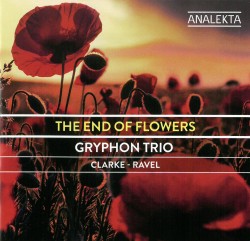 The End of Flowers
The End of Flowers
Gryphon Trio
Analekta AN 2 9520 (analekta.com)
There’s no explanation in the booklet about the CD’s title, The End of Flowers. An online search led to Gryphon cellist Roman Borys’ comments: “The First World War brought with it unprecedented loss of life, youth and hope. It was the end of flowers… fields lay barren, blasted and churned beyond recognition.” Borys continues: “In the winds of war Ravel and Clarke composed two remarkable piano trios… not intended as memorials but [which] stand as a testament to the enduring power of life and art.”
Rebecca Clarke left no programmatic description of her 1921 Piano Trio, two years after her other major work, the richly melodic Viola Sonata. Unlike the sonata, her trio evinces the influence of the war. Turmoil erupts immediately with the explosive opening of the Moderato ma appassionato, a movement marked by turbulent melodies, restless rhythms and a distinct bugle-call motif. The mournful Andante molto semplice is followed by the final Allegro vigoroso, alternating between a life-affirming folky tune and quiet reflection. There’s a reprise of the first movement’s agitation and the bugle call, but the trio ends on a positive, buoyant note. This gripping, emotion-filled work deserves to be much better known. Hear it!
Ravel’s familiar Piano Trio lacks obvious war-references, but it garners an especially gravitas-laden interpretation from the Gryphon Trio – University of Toronto artists-in-residence currently celebrating their 25th anniversary. Both of these marvellous works receive exemplary performances in a disc to hear and re-hear.



